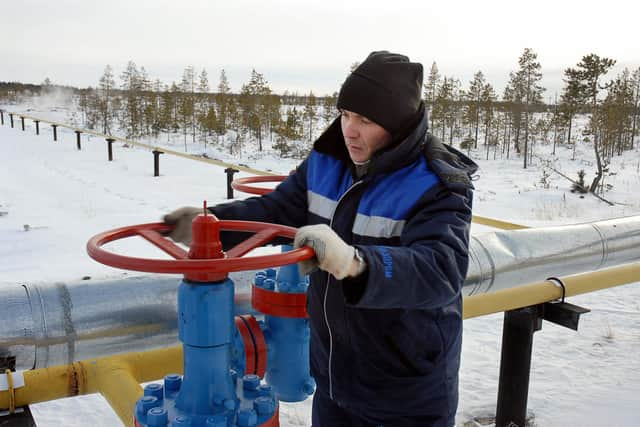Ukraine-Russia war: UK must rid itself of Russian money and gas – Alex Cole-Hamilton MSP
The response from the free democracies of the West has been necessarily swift and colossal, but it has also thrown light on two dependencies that we’ll have to wean ourselves off, and fast. Put simply, they are Russian fossil fuels and Russian cash.
The exposure of democratic countries to those dependencies is not uniform. The UK only relies on Russian gas for about five per cent of our energy mix, but we’re not immune to soaring prices caused by scarcity.
Advertisement
Hide AdAdvertisement
Hide AdHowever we do know the UK and, in particular, the City of London are absolutely swimming in Russian cash.
On the flipside, while no other European capital plays host to quite so many of Putin’s super-rich gangster mates, the further east you go, the more significant their dependency on Russian gas. That’s going to become hugely important in what happens next.
Germany is thought to get up to 60 per cent of its gas from Russia while Finland receives over 90 per cent. It means that should the West agree an embargo on Russian fossil fuels or were Russia to turn off the taps, then those countries are really going to suffer. It will also tighten still further the vice that most UK families find themselves in, in terms of the cost of living.
Gas is a global commodity. It doesn’t matter that we get ours from the North Sea or from France, if the wholesale price goes up (as it did by over 50 per cent at one point on Monday) then we’ll feel that pain too. There’s not much we can do about the cost of gas to householders in the short term, but we can do something to insulate them. I mean that both figuratively and literally.


The Scottish Government must urgently commence a massive programme of public works to insulate Scottish homes to reduce consumption (and by extension Scotland’s carbon footprint).
The second dependency is more of a problem for Britain than for others and that’s Russian money. Boris Johnson tried to steal the news agenda on Sunday with a half-baked ‘Marshall plan’ (it was really just a list of what everyone’s doing already) but it didn’t distract from news that he had gone against the recommendations of the security services and given a peerage to a Russian mate.
Evgeny Lebedev, now officially known as Lord Siberia, has made just one speech in the Lords and never voted, so it asks searching questions as to Johnson’s motives for his elevation to the upper chamber.
It’s well known that the Conservative party has been bankrolled by Russian oligarchs for years. Those relationships must now end and the extent of the influence they’ve bought laid bare.
Advertisement
Hide AdAdvertisement
Hide AdBut Russian money goes beyond our politics. We’ve all heard by now the concept of ‘Londongrad’, the industrial purchase of London property to launder Russian money, well it exists in Scotland too. We must open the land registry of Scotland and then identify and verify the ultimate beneficiaries of that cash.
If we are to truly stand with Ukraine, those twin dependencies must now end.
Alex Cole-Hamilton is Scottish Liberal Democrat MSP for Edinburgh Western
A message from the Editor:
Thank you for reading this article. We're more reliant on your support than ever as the shift in consumer habits brought about by coronavirus impacts our advertisers.
If you haven't already, please consider supporting our trusted, fact-checked journalism by taking out a digital subscription.
Comments
Want to join the conversation? Please or to comment on this article.
